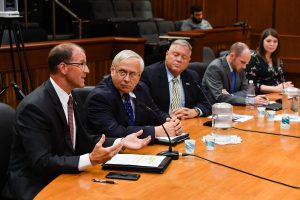District earns grant funding to give students mobile hotspots, but connectivity limitations persist

Approximately 15 percent of Fonda-Fultonville students have limited access to broadband internet at their homes. The issue has far reaching effects that are heightened in a time of remote learning.
Superintendent Thomas Ciaccio spoke on behalf of the district in published media reports this week about the impact of this issue as government officials consider legislation aimed at closing the gaps in service.
“The first priority needs to be ensuring that high speed broadband is seen as a basic utility that everyone can access, just like electricity or your phone service,” Ciaccio said. “Until this occurs, those in rural communities like Fonda-Fultonville will not have equal access to their education based on where they have chosen to live. This should not be an issue in the year 2021.”
Watch: WTEN news segment about push for rural broadband
Read more: Daily Gazette news story published Feb. 4, 2021
Overcoming the digital divide
FFCS has made it a priority to integrate technology into classrooms to make sure students will be successful in college and career. The district has launched a 1:1 Chromebook initiative that aims to put a device in the hands of each student.
“While providing devices at school solves one part of the problem, the digital divide still exists if students have no accessibility at home,” Ciaccio said said. “Having the device serves little purpose if the student is unable to get to their assignments and review materials once they have left the building. Our goal is to close this digital divide and create a level playing field for all learners.”
Grant funding used to purchase hotspots, but connectivity issues persist
Fonda-Fultonville was awarded $3,000 from the Walmart Foundation through its Gloversville store to support the district’s Rural Access initiative. The funds helped the district purchase WiFi and mobile hotspots for nearly 20% of their students who do not have internet access at home, and also to add Google Chromebooks to their laptop library.
Hotspots leverage a cellular connection for Internet access on devices. While hotspots can be helpful, they fall short of what is truly needed. In situations where multiple people (e.g., students and a caregiver working at home) are drawing from a single hotspot, the connection can be easily lost or weakened. Students need the stable, strong connection to broadband day in and day out.
“The establishment of broadband services in our school district’s rural areas is critical. In the past several years, Fonda-Fultonville has made it a priority to integrate technology into our classrooms to make sure our students will be successful in college and career,” Ciaccio said.
Low-cost internet service is available for families that participate in the free and reduced-price meal program. However, broadband needs to exist in those areas in order for families to take advantage of these low cost plans.
